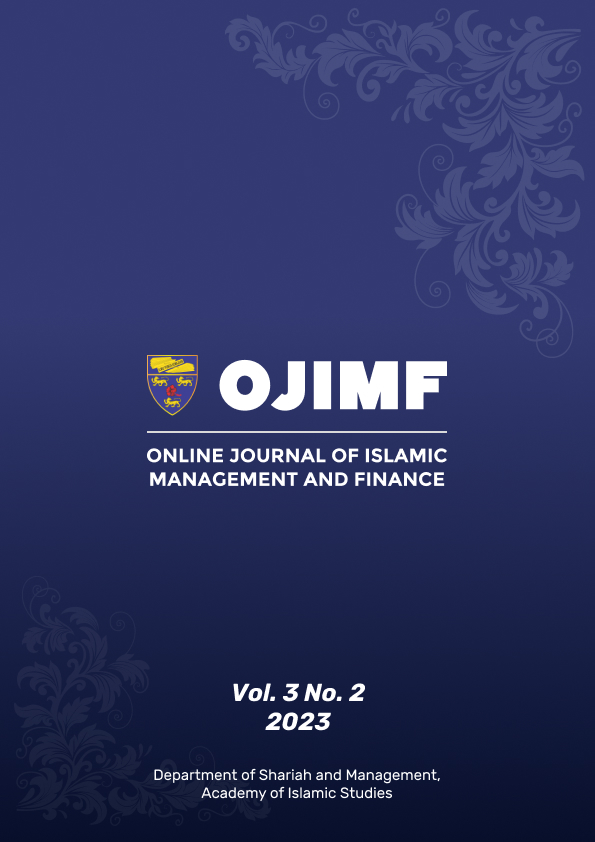أثر الامتثال على الحوكمة الشرعية في المصارف الإسلامية THE IMPACT OF COMPLIANCE ON SHARIA GOVERNANCE IN ISLAMIC BANKS
Main Article Content
Abstract
The study aims to identify the impact of compliance on Sharia governance in Islamic banks in Libya and Jordan. To achieve the objectives of the study, the research model is designed based on previous studies on the relationship between the research variables. The study sample includes a number of employees of Islamic banks in Libya and Jordan. Based on the quantitative approach in this research, all variables were tested by way of the SPSS application and the AMOS statistical software package. Out of 225 copies, (204) samples were collected from the employees of these banks whereby 21 questionnaires were excluded. The study has reached some findings, the most important of which is that there is a statistically significant effect of compliance on Sharia governance in Islamic banks in Libya and Jordan at a significant level of 0.05. It is also clear that the strength of the correlation is high, indicated by the high level of confidence and the high level of assumption amounting to 0.745. The findings also indicate the positive trend of this relationship, that is, compliance is directly proportional to the Sharia governance of the employees of Islamic banks in Libya and Jordan. The study also suggests some recommendations, the most important of which are: That banks should have a general and clear guide and framework for the principles of Sharia governance, and for compliance with laws and Sharia in addition to clearly defining functions. The study advises Islamic banks to deliberate on compliance by adopting and developing compliance functions and establishing an effective management system to evaluate compliance.
Downloads
Article Details
References
ابن عيسى، داود سلمان. (2020). "الحوكمة وتطبيقاتها على التدقيق والرقابة الشرعية"، دار البشائر الإسلامية للطباعة والنشر، الطبعة الأولى.
Al-Haddad, Zainab Ahmed Jaafar, and Alubaidy, Aradin Hatem. (2021). Banking Compliance and its Implications for Outstanding Performance: An Applied Study of a Sample of Iraqi Banks. Journal of Al-Rafidain University College of Science, 49.
Al-Hanini, Iman Ahmed, and Haymour, Sari Youssef. (2014). The Extent of Jordanian Islamic Banks' Commitment to the Principles of Corporate Governance. Journal of the Islamic University of Economics and Administration, XXI(II), 213-236.
Alnahedh, Abdulaziz Ahmed Saad. (2019). The Theory of Shariah Governance of Financial Institutions: An Applied Study of the Sharia Governance System of the State of Kuwait. Unpublished Ph.D. Thesis, International Islamic University Malaysia, p. 85.
Al-Wabel, Saad bin Ali Abdullah. (2019). Impact of Compliance with the Principles of Governance on the Efficiency of the Performance of Banks in the Kingdom of Saudi Arabia. Global Journal of Economics and Business, 6(1), 19–36.
Report of the Libyan Internal Control Authority for the year (2018-2019).
Ibn Isa, Dawud Salman. (2020). Governance and its Applications to Sharia Audit and Supervision, First Edition. Dar Al-Bashaer Al-Islamiyya for Printing and Publishing.
Kamal, Haouchine, and Samira, Haroun. (2016). Governance and compliance in banks and their role in the fight against the phenomenon of corruption and Prevention. Journal of Economic Dimensions, 1(5), 107-134.
Khalil, Aisha Ali, et al. (2019). The extent of application of governance principles in Libyan banks: A case study of the Jumhouria Bank, Al-Alous Branch, The Third International Scientific Conference of the Faculty of Economics and Commerce - Institutions and Development Problems in Developing Countries (Libya as a Model), 12-11 November, 2019, p. 350.
Qashi, Youssef, and Khaldun, Zainab. (2017). Islamic Banks' Compliance with Sharia Standards and its Importance in Activating Governance and Achieving Banking Safety. Journal of Development and Foresight for Research and Studies, 02(02), 31.
Salim, Mohammed Milad. (2022). Towards Activating Legitimate Governance in Financial Institutions Operating in Libya. Proceeding of the Fifth Academic Conference on Economics and Business Studies, Misurata University: 'Islamic Banks: Reality and Hope', 17-18 December, 2022, Faculty of Economics and Political Science Misurata, Libya.

